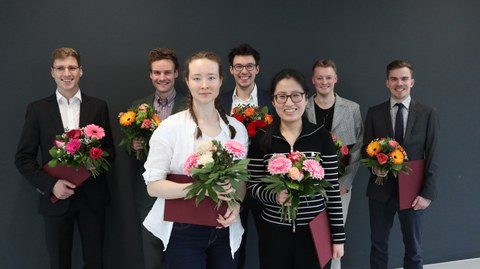Mar 07, 2024
Talent, innovation and inspiration: awards for the best theses in photonics and optoelectronics
At the 29th Photonics Colloquium of the Dresden Integrated Center for Applied Physics and Photonic Materials (IAPP) of TU Dresden and the Center for Applied Photonics e.V. on 29 February 2024, a total of seven outstanding theses in the field of photonics or optoelectronics from 2022 and 2023 were honored with the Goldberg and Harry Dember Prizes.
From basics to innovative applications: At the Dresden Integrated Center for Applied Physics and Photonic Materials (IAPP) at TU Dresden, scientists are looking for solutions in the field of photonics and optoelectronics that have the potential to improve people's lives and contribute to a more sustainable future. An interdisciplinary network that is particularly dedicated to pooling research efforts on organic semiconductors at TU Dresden. A look back over the past decades shows the success of the center and its scientists: numerous prizes - including the German Future Prize or the European Inventor Award for exceptional scientist Prof. Karl Leo or the eight start-ups that have emerged from IAPP, such as Novaled or Heliatek. And so it is also a tradition that a leader of a spin-off company is present to honor the best early-career researchers at the annual Photonics Colloquium. This year it was Dr. Guido van Tartwijk, CEO of Heliatek GmbH.
To ensure that the IAPP's success and innovative strength continues in the coming decades, it needs talented, committed, innovative and courageous early-career researchers who dare to push boundaries and pursue new ideas. The Emanuel Goldberg Prize and the Harry Dember Prize are awarded to the best of these minds for their excellent theses.
The Emanuel Goldberg Prize, awarded by the Robert Luther Foundation, honors particularly outstanding dissertations in the fields of optoelectronics and photonics. It serves to honor the memory of Prof. Emanuel Goldberg, a long-forgotten contemporary and companion of Robert Luther and honorary professor at the Scientific Photographic Institute (WPI) of the Dresden University of Technology (1921-1933), who has been erased from the collective consciousness.
The Emanuel Goldberg Prize for 2022 will be awarded to Dr. Shen Xing for her work on understanding and improving organic photodetectors. In her work, Dr. Xing has made significant contributions to the understanding and improvement of organic photodetectors and achieved device structures with new record parameters.
The prize for 2023 was split between two outstanding scientists: Dr. Anton Kirch and Dr. Anton Weissbach. Anton Weissbach's interdisciplinary work in chemistry and physics focused on the properties of novel organic electrochemical transistors. He has introduced novel material approaches that significantly improve the practical suitability of these components for electronic circuits. His work contributes to novel, biocompatible and environmentally friendly electronics. Dr. Kirch's work deals with organic light-emitting diodes (OLEDs). His work describes the movement of charge carriers in organic light-emitting diodes (OLEDs) and links the fundamental phenomena researched with their implications for technological feasibility.
The Harry Dember Prize for particularly outstanding master's or diploma theses at TU Dresden in the fields of optics, optoelectronics, photonics and imaging scanning probe methods commemorates the Dresden physicist Prof. Harry Dember, discoverer of the effect named after him. Dember was expelled by the National Socialists in 1933 after many years of successful work in the Department of Physics at the then TH Dresden and emigrated to Turkey and then to the USA, where he died in 1942.
The Harry-Dember Prize is awarded by the Center for Applied Photonics. The prize for 2022 was awarded to Conrad Winkler for his work entitled "Exploring Organic Semiconductors for Optical Sensing" and Jakob Lindenthal for "Optoelectronic Pressure Sensing Utilizing a One-Dimensional Topological Interface".
Two people were also honored with the Harry December Prize for 2023: Iulia Kiseleva for "Toward Reproducible Domain-Wall Conductance in Lithium Niobate Single Crystals" and Sebastian Kaiser for "Spectroscopic Measurements of Organic Semiconductors in Gas Phase".
The laudatory speech for the award winners was held by TUD Rector Prof. Ursula Staudinger. Following the award ceremony, Prof. Dr. Alexander Eychmüller from the Chair of Physical Chemistry at TU Dresden introduced the audience to "The Wonderful World of Nanocrystals" in a keynote speech. For Prof. Karl Leo, Director of the Institute of Applied Physics at TU Dresden and Chairman of the Advisory Board of the Robert Luther Foundation, the Photonics Colloquium is always a very special event: "Nothing is better than honoring the outstanding scientific work of talented young people with an award. The award-winning work ranges from basic research to application and will certainly also play a role in new spin-offs."

